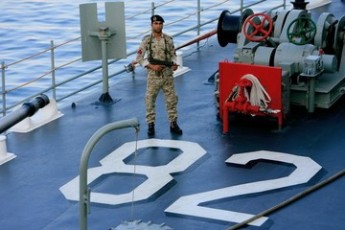Sudan agreed to Iran request for establishing military base ‘at the right time’: cable
June 19, 2015 (WASHINGTON) – The Sudanese government agreed in principle to establish an Iranian military base, according to a cable released by Wikileaks today.
 WikiLeaks published on Friday more than 60,000 diplomatic cables from Saudi Arabia and said on its website it would release half a million more in the coming weeks.
WikiLeaks published on Friday more than 60,000 diplomatic cables from Saudi Arabia and said on its website it would release half a million more in the coming weeks.
A cable classified as ‘Secret’ with the letterhead ‘Saudi Arabia – Directorate of General Intelligence’ discussed information they received on a request to this effect by the Iranian government.
Saudi intelligence said that the head of Iran parliamentary security subcommittee Ala al-Din Boroujerdi sent a letter to the head of the National Intelligence and Security Services (NISS) Mohamed Atta Abbas asking for approval to establish this base.
To discuss this, members of the ruling National Congress Party (NCP) met on May 18, 2012 at the residence of Sudan 2nd VP al-Haj Adam Youssef with the presence presidential assistant Nafie Ali Nafie, NISS director Mohamed Atta Abbas, defense minister Abdel-Rahim Mohamed Hussein, presidential adviser Mustafa Osman Ismail and minerals minister Kamal Abdel-Latif described incorrectly as the justice minister.
The participants agreed to temporarily close this dossier, the cable says, and not to discuss it and not to present it to other NCP members due to the “sensitivity of the issue”.
Ismail was tasked with conveying that they cannot agree to this request at present and “clarifying Sudan’s critical situation” but at the same time expressing their “preliminary approval of this project and postponing talks on this regard until the right time”.
In December 2012, Sudan denied reports that it has given the go-ahead to Iran for establishing a Red Sea naval base saying it conflicts with government policy.
Since 2012, Port Sudan has become a regular stop for Iranian warships drawing concern by the US and its allies in the Gulf. Khartoum insisted that its relations with Iran are based on common interests and not intended to threaten the interests of the Arab Gulf states.
Iran says that In line with international efforts to combat piracy its Navy has been conducting anti-piracy patrols in the Gulf of Aden since November 2008 to safeguard the vessels involved in maritime trade, especially the ships and oil tankers owned or leased by Tehran.
Israel also accuses Sudan of serving as a hub for weapons coming from Iran that are sent to Palestinian militants. It is believed to have conducted several airstrikes inside Sudan including one in October 2012 that targeted the Al-Yarmouk arms factory in Khartoum.
(ST)
